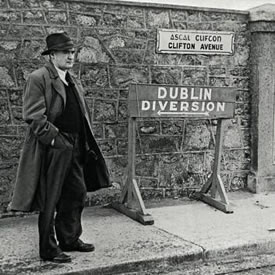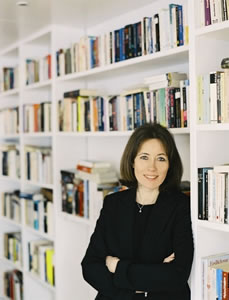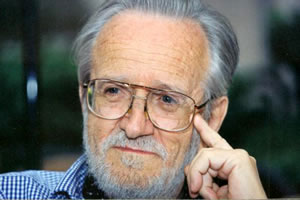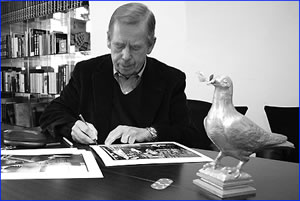|
De Ierse schrijver Flann OBrien werd geboren op 5 oktober 1911 in Strabane, County Tyrone. Zie ook mijn blog van 5 oktober 2008 en ook mijn blog van 5 oktober 2009.
Uit: The Poor Mouth
I AM NOTING down the matters which are in this document because the next life is approaching me swiftlyfar from us be the evil thing and may the bad spirit not regard me as a brother!and also because our likes will never be there again. It is right and fitting that some testimony of the diversions and adventures of our times should be provided for those who succeed us because our types will never be there again nor any other life in Ireland comparable to ours who exists no longer.
...more
O'Coonassa is my surname in Gaelic, my first name is Bonaparte and Ireland is my little native land. I cannot truly remember either the day I was born or the first six months I spent here in the world. Doubtless, however, I was alive at that time although I have no memory of it, because I should not exist now if I were not there then and to the human being, as well as to every other living creature, sense comes gradually.
The night before I was born. it happened that my father and Martin O'Bannassa were sitting on top of the hen-house, gazing at the sky to judge the weather and also chatting honestly and quietly about the difficulties of life.
- Well, now. Martin, said my father, the wind is from the north and there's a forbidding look about the White Bens; before the morning there'll be ram and we'll get a dirty tempestuous night of it that will knock a shake out of us even if we're in the very bed. And look here! Martin, isn't it the bad sign that the ducks are in the nettles? Horror and misfortune will come on the world tonight; the evil thing and sea-cat will be a-foot in the darkness and, if tis true for me, no good destiny is ever in store for either of us again.
- Well, indeed, Michelangelo, said Martin O'Bannassa, 'tis no little thing you've said there now and if you're right, you've told nary a lie but the truth itself.
I was born in the middle of the night in the end of the house. My father never expected me because he was a quiet fellow and did not understand very accurately the ways of life. My little bald skull so astounded him that he almost departed from this life the moment I entered it and, indeed. it was a misfortune and harmful thing for him that he did not, because after that night he never had anything but misery and was destroyed and rent by the world and bereft of his health as long as he lived. The people said that my mother was not expecting me either and it is a fact that the whisper went around that I was not born of my mother at all but of another woman. All that, nevertheless, is only the neighbours' talk and cannot be checked now because the neighbours are all dead and their likes will not be there again. I never laid eyes on my father until I was grown up but that is another story and I shall mention it at another time in this document.

Flann OBrien (5 oktober 1911 1 april 1966)
De Duitse schrijfster Charlotte Link werd geboren op 5 oktober 1963 in Frankfurt am Main. Zie ook mijn blog van 5 oktober 2007 en ook mijn blog van 5 oktober 2008 en ook mijn blog van 5 oktober 2009.
Uit: Wenn die Liebe nicht endet
Ein Schauspieler in Narrenkleidung führte Späße vor, beobachtet von einigen kichernden Dorfmädchen. Er jonglierte mit Kieselsteinen, ließ ein Ei verschwinden und wieder auftauchen
und wackelte mit den Ohren. Ein dicker Wirt bot erwärmtes, schäumendes Bier an, das er aus einer Holzschale in Becher schöpfte, daneben arbeiteten ein Schuhmacher und ein Seifensieder.
Ein Kupferschmied hämmerte auf einem Stück glänzenden Kupfers herum, und ein Leintuchkrämer breitete große saubere Leinwandbahnen auf Brettern aus und pries nicht vorhandenen Zuhörern die Vorzüge der Stoffe.
Die drei Mädchen schlenderten von einem Wagen zum anderen. Sie waren so lange nicht mehr aus dem Kloster herausgekommen, dass ihnen alles neu und aufregend schien. Fasziniert blickten sie auf die Frauen, die in den Wagen saßen, auf verhärmte Gesichter, in denen sie nicht die Entbehrungen und das Elend sahen, sondern nur Zauber des Reisens und der Abenteuer. Im ganzen Reich sind sie schon gewesen, dachte Margaretha, wie großartig muss es sein, so weit herumzukommen!
Und schließlich blieben sie lange vor einem Stand stehen, an dem Schmuck verkauft wurde. Es funkelte alles so bunt im kalten Winterlicht. Margaretha wünschte sich ein Paar Ohrringe mit
Steinen aus grünem Glas, Clara konnte sich nicht satt sehen an einem breiten Armband, mit Glasstücken besetzt, und Angela strich über eine zweireihige Kette aus silbrigem Blech. Ein
kleiner, dunkelhaariger Mann trat heran.
Gefällt Ihnen die Kette? fragte er. Seine Stimme hatte einen fremdländischen Klang.
Sie ist wunderschön, entgegnete Angela. Der Mann ergriff die Kette und hängte sie Angela um den Hals. Er trat einen Schritt zurück.
Wie ein Engel, sagte er ehrfürchtig.
Auch die anderen fanden das. Der Schmuck unterstrich auf wunderbare Weise Angelas edle Gesichtszüge.
Darf ich Ihnen die Kette schenken? fragte der Mann.
Angela seufzte.
Wir dürfen so etwas leider nicht tragen, meinte sie, außerdem kann ich das nicht annehmen.

Charlotte Link (Frankfurt am Main, 5 oktober 1963)
De Chileense schrijver José Donoso (eigenlijk Jose Donoso Yáñez) werd geboren op 5 oktober 1924 in Santiago de Chile. Nadat Donoso drie jaar aan het Pedagogisch Instituut van de Universidad de Chile had gestudeerd, kreeg hij een tweejarige studiebeurs voor de universiteit van Princeton. Hier behaalde hij in 1951 het Bachelordiploma. Tijdens zijn tijd in Princeton, publiceerde hij verhalen in het Engels. Hij werkte daarna als docent Engelse literatuur en Engels op universiteiten in Chili, maar ook als journalist. In 1956 bekroonde de stad Santiago de Chile hem met een prijs voor zijn eerste bundel korte verhalen. Het daarop volgende jaar publiceerde hij zijn eerste roman, De kroning. Voor de Engelse vertaling werd hem in 1962 de William Faulkner Foundation Prize toegekend. In 1958 reisde Donoso naar Buenos Aires, waar hij in contact kwam met belangrijke Argentijnse schrijvers als Jorge Luis Borges en ontmoette hij zijn toekomstige vrouw. In 1964 verliet hij Chili en hij keerde pas zeventien jaar later terug. In die tijd woonde hij vooral in Spanje, maar ook in de Verenigde Staten. Tijdens deze jaren schreef hij zijn beroemde romans. In 1986 schreef hij The Island of the Dead, een kritische roman over het leven in Chili onder de dictatuur van Augusto Pinochet. In 1990 werd hij bekroond met de Premio Nacional de Literatura de Chile, de hoogste onderscheiding voor literatuur in Chili.
Uit: Curfew (Vertaald door Alfred MacAdam)
Was this an accomplice? What did she know? Did she know that his soft hand perspired when he placed it on the knee of a woman he felt to be powerful? Did Christinita, exempted the same way Judit was, enjoy strange privileges in exchange for keeping Ricardo's secret? Liliana didn't know that if her plans for Ricardo worked out, she too was condemned to pardon. The complicity between the two of them was negligible, unimportant, partial, which shouldn't have surprised her, since these were unimportant human beings who only acquired life in the reflected light of cruelty. Was it important that this man, with his high, falsely noble forehead, vigorous neck, black mustache above loquacious lips, engrossed in a dissertation on Boris, would pay for pardoning her? Was it possible for her to aim the pistol at him and avenge all pardons, including the imprudent Lilianita's? Because from the beginning in Ada Luffs house--and she, and son Cesar, and all the women knew it--this was no seduction but a murder.
The pup was really splendid, said Ricardo. He'd won prizes at every show his daughter Cristy had entered him in. They were rare, these miniature Dobermans, as ferocious as the regular kind and much easier to train, even if at the beginning you had to punish them so they'd see the difference between what they could and couldn't do. Farias had punished her with the worst punishment imaginable. No, he hadn't punished her. He'd condemned her, because ever since her return from Caracas, with the remains of her ideology in rags after so much time and distance, she could not focus on anything but finding the man responsible for the rapes.
When she'd returned, she'd reestablished her network of accomplices from her underground days and sought their knowledge of the urban night--don Cesar, with his contacts and pals and his knowledge of jokes, bars, and wine, and Aury with her beauty-parlor chatter, and Dario's father and Dario himself, with the kids in his slums, and Ada Luz--enlisting their help in her plan to destroy the past and begin again at zero. But every lead until now had turned into a dead end, and she and the others always came back empty-handed. It was never the right man.

José Donoso (5 oktober 1924 - 7 december 1996)
De Tsjechische schrijver en politicus Václav Havel werd op 5 oktober 1936 in Praag geboren. Zie ook mijn blog van 5 oktober 2006 en ook mijn blog van 5 oktober 2008 en ook mijn blog van 5 oktober 2009.
Uit: Summer Meditations (Vertaald door Paul Wilson)
Evil will remain with us, no one will ever eliminate human suffering, the political arena will always attract irresponsible and ambitious adventurers and charlatans. And man will not stop destroying the world. In this regard, I have no illusions. Neither I nor anyone else will ever win this war once and for all. At the very most, we can win a battle or two-- and not even that is certain. Yet I still think it makes sense to wage this war persistently... This must be done on principle, because it is the right thing to do. Or, if you like, because God wants it that way.
(...)
It seems I am a naive dreamer trying to reconcile the irreconcilable, i.e., politics and morals. I know that theme well, I have heard it since forever. . . . Violence is well-known to breed violence, which is why most revolutions have degenerated into dictatorships, devouring their own offspring and bringing into the world new revolutionaries prepared for renewed violence, not knowing that they were digging their own graves and confining society in a vicious circle of revolutions and counter-revolutions. Communism was defeated by life, by thought, by integrity. Yet [there are] those who, even today, assert that politics is above all a manipulation of power, of public opinion, and that morals have no place in it. Politicking is not politics. . . .
True politics, worthy of the name -- and the only kind I will practice -- is the politics of service to one's neighbor. Service to the community; service to those who will succeed us. Its origin is moral because it is nothing but responsibility realized toward all and by all. It is such responsibility that in itself constitutes superior responsibility by the fact that it is based in metaphysics; it is nourished by certitude, conscious or unconscious, that nothing ends by death, that all is recorded forever, all is appraised elsewhere, somewhere "above us" in what I have called the memory of being, in that part which is inseparable from the mysterious order of the cosmos, of nature, and of life, which believers call God, and to whose judgment all are subject.

Václav Havel (Praag, 5 oktober 1936)
Zie voor nog meer schrijvers van de 5e oktober ook mijn vorige blog van vandaag.
05-10-2010 om 19:42
geschreven door Romenu 
Tags:Flann O’Brien, Charlotte Link, José Donoso, Václav Havel, Romenu
|

